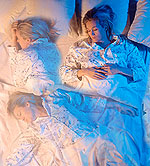
THURSDAY, May 17 (HealthDay News) — Parents of young children with epilepsy often sleep in the same room or the same bed as their child to monitor their condition, but the bed-sharing may be interfering with restful sleep for both the parents and kids, new research finds.
In the study, published in the journal Epilepsia, researchers from Massachusetts General Hospital for Children in Boston examined the sleeping arrangements of 105 families who had a child with the seizure disorder and 79 families whose children did not have epilepsy (“controls”).
The children ranged in age from 2 to 10 years. Among the children with epilepsy, about 41 percent had seizures within the first year of life, while the mean age of seizure onset was about 2 years. In addition, 64 percent had at least one seizure within the last month and 37 percent had daily seizures.
About 64 percent of parents who shared a bed with their epileptic child said they started co-sleeping after the diagnosis. About the same number — nearly two-thirds — said they didn’t co-sleep with their child’s non-epileptic siblings at that age.
“Our study determined that households with a child with epilepsy had higher rates of parent-child room sharing and co-sleeping compared to controls,” Dr. Elizabeth Thiele said in a journal news release.
About 69 percent of parents said they worried about their child having a seizure at night.
But being closer to their epileptic child wasn’t helping parents sleep any better. About 62 percent of parents said they slept more poorly since they started sharing a bed with their epileptic child, while 44 percent of parents said they “rarely” or “never” felt rested.
The study authors also found that children with epilepsy had more sleep problems, including waking up at night, being tired during the day and trouble going to bed at night.
“Our study demonstrates the profound impact of epilepsy on child and parent sleep patterns,” concluded Thiele.
More information
The U.S. National Institute of Neurological Disorders and Stroke has more on epilepsy.

